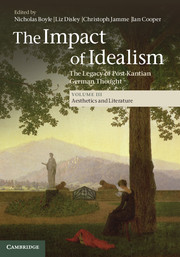Book contents
- Frontmatter
- Contents
- List of Illustrations
- List of Contributors
- Acknowledgements
- List of Abbreviations
- Introduction: Idealism in aesthetics and literature
- 1 The legacy of Idealism and the rise of academic aesthetics
- 2 Hegel's philosophical theory of action: the concept of action in Hegel's practical philosophy and aesthetics
- 3 Tragedy and the human image: German Idealism's legacy for theory and practice
- 4 Romanticism as literary Idealism, or: a 200-year-old way of talking about literature
- 5 Idealism in nineteenth-century German literature
- 6 Idealism in nineteenth-century British and American literature
- 7 Elements of Schopenhauer's thought in Beckett
- 8 German Idealism and the philosophy of music
- 9 The music of German Idealism
- 10 ‘Refiner of all human relations’: Karl Friedrich Schinkel as an Idealist theorist
- 11 Influences of German Idealism on nineteenth-century architectural theory: Schelling and Leo von Klenze
- 12 ‘Making a world’: the impact of Idealism on museum formation in mid-nineteenth-century Massachusetts
- 13 Hegel, Danto and the ‘end of art’
- Bibliography
- Index
- References
Introduction: Idealism in aesthetics and literature
Published online by Cambridge University Press: 05 December 2013
- Frontmatter
- Contents
- List of Illustrations
- List of Contributors
- Acknowledgements
- List of Abbreviations
- Introduction: Idealism in aesthetics and literature
- 1 The legacy of Idealism and the rise of academic aesthetics
- 2 Hegel's philosophical theory of action: the concept of action in Hegel's practical philosophy and aesthetics
- 3 Tragedy and the human image: German Idealism's legacy for theory and practice
- 4 Romanticism as literary Idealism, or: a 200-year-old way of talking about literature
- 5 Idealism in nineteenth-century German literature
- 6 Idealism in nineteenth-century British and American literature
- 7 Elements of Schopenhauer's thought in Beckett
- 8 German Idealism and the philosophy of music
- 9 The music of German Idealism
- 10 ‘Refiner of all human relations’: Karl Friedrich Schinkel as an Idealist theorist
- 11 Influences of German Idealism on nineteenth-century architectural theory: Schelling and Leo von Klenze
- 12 ‘Making a world’: the impact of Idealism on museum formation in mid-nineteenth-century Massachusetts
- 13 Hegel, Danto and the ‘end of art’
- Bibliography
- Index
- References
Summary
Two events occurring in the year 1916 might serve briefly to encapsulate the far-reaching and international bequest of German Idealism to aesthetics and literature. It was a year in which the work of writers and artists distilled an apocalyptic world-historical sense, and in Dublin Yeats saw a ‘terrible beauty’ born. A cabaret hall in Zurich gave birth to the artistic movement known as Dada, which sought to respond to the horrors of the First World War by tearing down the illusion of the unified ego that contemporary art – for all its cataclysmic expressionism – seemed to maintain. It did this by meeting negation, the desolate experience of history, with negation. Dada issued from presuppositions that foretold its own ephemerality; but some of its more notorious products have not escaped a certain canonicity and, together with other subsequent movements and developments, it represents an apparent collapse of the distinction between art and non-art in the historical conditions of the twentieth century, which has seemed to call repeatedly for the application of philosophical terms formulated around a hundred years earlier. Whether such manifestations are indeed the fulfilment of Hegel's prophecy for modern art is doubtful: they seem rather to express an ‘indeterminate’, or speculatively deficient, negation, and the nature of such negations is the question pursued by one contributor to this volume. It is, however, beyond doubt that Idealist aesthetics continue to be an inescapable point of reference for addressing the meaning of art, and that – in common with all aspects of the German Idealist inheritance, as the other volumes comprising The Impact of Idealism show – the accounts of aesthetics present in German post-Kantian philosophy seem to supply an idiom for thinking about these matters that has not been surpassed in its conceptual power by the advent of postmodernity. The Idealist understanding of art as the sensuous appearance of freedom (that is, the substance of spirit) as beauty generates a set of tensions that continue to define theoretical engagement with art.
- Type
- Chapter
- Information
- The Impact of IdealismThe Legacy of Post-Kantian German Thought, pp. 1 - 10Publisher: Cambridge University PressPrint publication year: 2013



